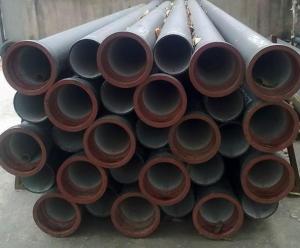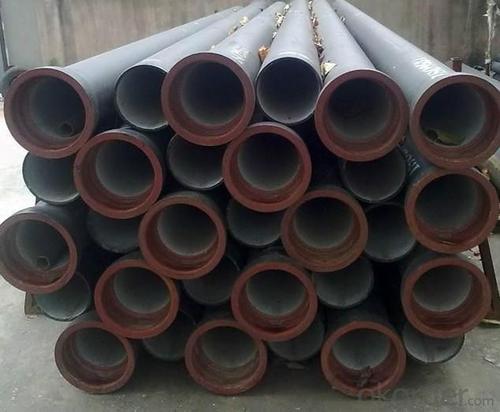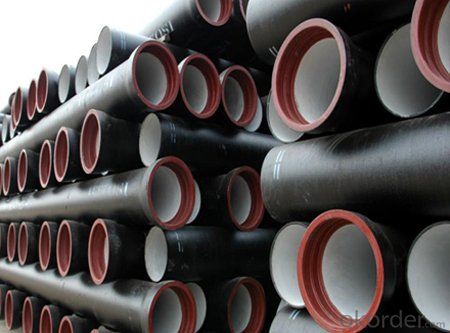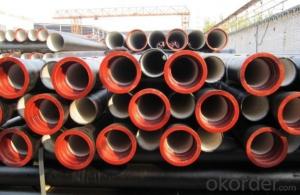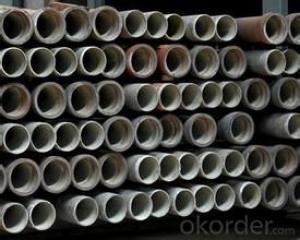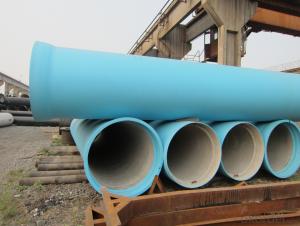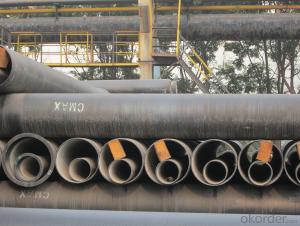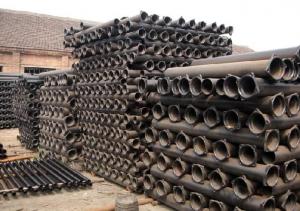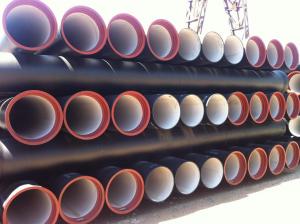Ductile Iron Pipe of China Comply with EN545
- Loading Port:
- China main port
- Payment Terms:
- TT or LC
- Min Order Qty:
- 1000 m
- Supply Capability:
- 100000 m/month
OKorder Service Pledge
OKorder Financial Service
You Might Also Like
1. Ductile Iron Pipe Description :
It has high strength & hardnes as steel and better corrosin resistance than steerl and grey iron, I ductile iron pipe is the ideal substute for gray cast iron pipe and common steel pipe. In addition, our DI pipes are produced with good straightness, identical wall thickness, high dimension accuracy, smooth surface finished, remarkable mechanical properties and firmly sticking internal & external coating layer as well.
2. Ductile Iron Pipe Main Features:
1. ISO 2531 or EN 545 Standard K9 Class, K7 Class and C Class
2. ISO 9001 Certificate
3. ISO 2531 & EN 545 Certificate
4. WRAS Potable Water Certificate for Cemen Internal Lining
5. WRAS EPDM Rubber Gasket or NBR Rubber Gasket
6. DN80mm - DN2600mm
3.Ductile Iron Pipe Images:
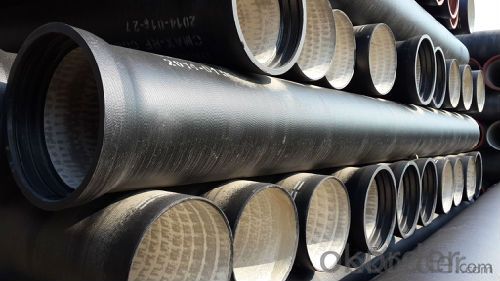
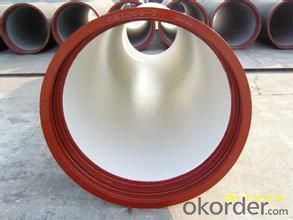
4.Ductile Iron Pipe Specification:
1.Standard:ISO2531,EN545,EN598
2.Effective Length:6m/5.7m
3.Internal Lining :Cement mortar, Cement mortar Plus Epoxy
4.External coating:Zinc Primer Plus Bitumen or PE
5. Shipment: By bulk ship or 20'/40' container
6. Rubber: NBR, SBR, EPDM according to ISO4633/EN681.1
7.Quick Delivery
5.FAQ:
· Management Systems-Internal Software
· Finished Product Inventory-More Than 5000 Tons.
· Raw Material inventory -Over 8000 Mertic Tons.
· The most convenient transport and prompt delivery.
· Competitive price with best service .
· High technical production line with top quality products.
· High reputation based on best quality products.
- Q: Are ductile iron pipes suitable for horizontal directional drilling (HDD) installations?
- Ductile iron pipes are indeed suitable for horizontal directional drilling (HDD) installations. Renowned for their robustness and durability, ductile iron pipes prove to be an exceptional option for HDD projects. The process of HDD entails creating a horizontal tunnel underground and inserting a pipe through it. This can be quite challenging due to the immense forces exerted on the pipe during the installation. Nevertheless, ductile iron pipes have the capability to endure these forces and maintain their structural integrity, thus ensuring a successful HDD installation. Furthermore, ductile iron pipes possess outstanding resistance to corrosion, making them suitable for a wide range of soil and environmental conditions frequently encountered during HDD projects. In conclusion, ductile iron pipes possess the necessary characteristics to withstand the demanding conditions of HDD installations and remain a dependable choice for such applications.
- Q: What are the environmental benefits of using ductile iron pipe?
- Using ductile iron pipe in various applications brings numerous environmental benefits. Firstly, ductile iron is an incredibly durable material that can endure harsh environmental conditions and has a long lifespan. As a result, the need for frequent pipe replacements is significantly reduced compared to other materials, leading to a decrease in resource-intensive manufacturing processes and the disposal of old pipes. Secondly, ductile iron pipes possess exceptional corrosion resistance properties, which lowers the risk of leaks and pipe failures. This not only prevents potential water contamination but also minimizes water wastage. Furthermore, ductile iron is a recyclable material. When the pipes reach the end of their useful life, they can be melted down and used to create new products. This reduces the demand for virgin materials and conserves natural resources. Moreover, the manufacturing process of ductile iron pipes has greatly improved over time, resulting in reduced energy consumption and emissions. Many manufacturers now utilize energy-efficient technologies and practices, contributing to a lower carbon footprint and decreased air pollution. Lastly, ductile iron pipes have a smooth internal surface that minimizes friction and allows for efficient water flow. This leads to energy savings in pumping and distribution systems, as less energy is required to transport water through the pipeline network. Overall, the utilization of ductile iron pipe positively impacts the environment by reducing waste, conserving resources, minimizing pollution, and enhancing energy efficiency in water distribution systems.
- Q: How can the ductile iron pipes be treated with corrosion protection?
- Epoxy coal tar coatingThe epoxy coal tar coating is not only suitable for gas pipelines, but also for sewage pipes. It is a two component coating with a high adhesion and a very smooth surface
- Q: What is the expected pressure rating for ductile iron pipes?
- The expected pressure rating for ductile iron pipes can vary depending on various factors such as the pipe diameter, wall thickness, and the specific application it is being used for. However, generally speaking, ductile iron pipes are designed and manufactured to withstand high-pressure conditions. They are commonly used in water and wastewater systems, where they can typically handle pressures ranging from 150 psi (pounds per square inch) up to 350 psi or even higher. It is important to consult the manufacturer's specifications or relevant industry standards for specific pressure ratings based on the pipe's size and application to ensure safe and reliable operation.
- Q: What are the disadvantages of using ductile iron pipes?
- Using ductile iron pipes in various applications comes with several drawbacks. Firstly, these pipes tend to be more expensive compared to other types like PVC or HDPE, which can be problematic for projects with budget constraints. Secondly, their relatively heavy weight makes transportation and installation more labor-intensive and time-consuming. This increases overall project costs, especially when specialized equipment and skilled workers are required. Another disadvantage is their susceptibility to corrosion. Exposure to environmental factors, like soil conditions and water chemistry, can lead to rust and scale formation on the inner and outer surfaces of the pipe. This reduces the pipe's lifespan and potentially affects water quality. Furthermore, ductile iron pipes can crack or break under certain conditions, especially when subjected to heavy loads or significant ground movement. This necessitates costly repairs or replacements, causing additional expenses and disruptions to the water supply. Lastly, ductile iron pipes have relatively low resistance to impact and abrasion compared to other materials. This makes them more vulnerable to damage from external forces, such as construction activities or accidental impacts, resulting in increased maintenance and repair costs. In conclusion, while ductile iron pipes have advantages like high tensile strength and durability, it is crucial to consider these disadvantages before deciding to use them in a specific project.
- Q: Will nodular cast iron pipes rust?
- Qualified ductile iron pipe requires lining standard cement. The outer wall of pipe needs spraying zinc treatment and asphalt paint coating, and other epoxy resin paint can also be selected. Qualified ductile iron pipes can be used for more than a hundred years. The main place where rust is easily exposed is where the outer wall meets the soil because of its high humidity and high oxygen content. Qualified anticorrosion can effectively resist rust, its process principle can not give you the details.
- Q: How are ductile iron pipes inspected for quality control?
- Ductile iron pipes are inspected for quality control through a series of rigorous tests and inspections to ensure their compliance with industry standards. One of the most common methods used is visual inspection, where trained inspectors examine the pipes for any visible defects such as cracks, pits, or surface irregularities. This helps in identifying any visual defects that may compromise the overall quality of the pipes. In addition to visual inspection, another crucial quality control measure is dimensional inspection. This involves measuring the dimensions of the pipes, such as diameter, wall thickness, and length, using specialized tools and equipment. By comparing these measurements against the specified tolerances, any deviations can be identified, and necessary corrective actions can be taken. Another important quality control step is hydrostatic pressure testing. In this test, the pipes are subjected to internal pressure that is higher than their intended operating pressure. This ensures that the pipes can withstand the required pressure without any leakage or failure. The test involves filling the pipes with water and gradually increasing the pressure, while closely monitoring for any signs of leakage or deformation. Furthermore, ductile iron pipes undergo various mechanical tests, such as tensile strength testing and impact testing, to evaluate their mechanical properties. These tests involve applying controlled forces or impacts to the pipes and measuring their response. By doing so, the strength, toughness, and durability of the pipes can be assessed, ensuring they meet the necessary requirements. Lastly, metallurgical examinations are conducted to analyze the microstructure of the ductile iron pipes. This involves taking samples from the pipes and using microscopy techniques to examine the grain structure, phase distribution, and any potential defects at a microscopic level. This helps in identifying any issues that may not be visible to the naked eye but could affect the overall quality of the pipes. Overall, the inspection process for ductile iron pipes involves a combination of visual, dimensional, hydrostatic, mechanical, and metallurgical tests. These quality control measures help ensure that the pipes meet the required standards, providing reliable and durable infrastructure for various applications.
- Q: Are ductile iron pipes resistant to frost heave?
- Ductile iron pipes are generally considered to be resistant to frost heave. Frost heave occurs when water in the ground freezes and causes the surrounding soil to expand and lift. Ductile iron pipes have high tensile strength and flexibility, which allows them to withstand the forces exerted by frost heave without cracking or breaking. Moreover, ductile iron pipes have a high resistance to impact and can handle significant external loads. This makes them particularly suitable for areas that experience freezing temperatures and potential frost heave. Additionally, the joints in ductile iron pipes are designed to provide a tight seal and prevent water infiltration, reducing the risk of freezing and subsequent frost heave. However, it is important to note that while ductile iron pipes are resistant to frost heave, they are not completely immune to it. Extreme temperature fluctuations, prolonged freezing conditions, or inadequate insulation can still pose a risk to the integrity of the pipes. Therefore, proper installation techniques, including appropriate bedding and backfilling materials, thermal insulation, and proper maintenance, are crucial to ensure the long-term performance and resistance of ductile iron pipes to frost heave.
- Q: What is the expected joint performance of ductile iron pipes?
- Ductile iron pipes are widely recognized for their outstanding joint performance. They possess exceptional durability and strength, making them suitable for a wide range of applications, including water distribution, sewer systems, and industrial pipelines. One crucial aspect of joint performance in ductile iron pipes is their ability to withstand external loads and pressure. To ensure minimal leakage and long-term structural integrity, the joints in these pipes are designed to create a tight and secure connection. This is accomplished through the utilization of various joint types, such as push-on joints, mechanical joints, and restrained joints. Push-on joints are commonly employed in ductile iron pipes due to their ease of installation. They do not require any specialized tools or equipment. These joints rely on a rubber gasket, which guarantees a watertight seal and prevents leakage. On the other hand, mechanical joints involve the use of mechanical devices, such as bolts and nuts, to establish a rigid connection between the pipes. This type of joint provides additional strength and resistance against external forces. Ductile iron pipes have undergone extensive testing to ensure their performance meets or exceeds industry standards for pressure and bending strength. They exhibit high resistance to corrosion, resulting in a longer service life. Additionally, they are less susceptible to damage caused by ground movements or vibrations. These properties contribute to the overall joint performance of ductile iron pipes, ensuring reliable and efficient operation in various infrastructure systems. When properly installed and maintained, ductile iron pipes display remarkable joint performance. They provide a reliable and durable solution for numerous applications within the water and wastewater industry.
- Q: Classification of cast iron pipes
- Water cast iron pipe:The use of cast iron cast iron water pipe of No. 18 above by adding nodulizer, after centrifugal ductile cast iron pipe by centrifugal casting machine, the performance of ductile iron pipe with nature, iron and steel, excellent corrosion resistance, good ductility, good sealing effect, simple installation, mainly for municipal, industrial and mining enterprises water, gas, oil etc.. Water supply pipe is the first choice, with high cost performance.
Send your message to us
Ductile Iron Pipe of China Comply with EN545
- Loading Port:
- China main port
- Payment Terms:
- TT or LC
- Min Order Qty:
- 1000 m
- Supply Capability:
- 100000 m/month
OKorder Service Pledge
OKorder Financial Service
Similar products
Hot products
Hot Searches
Related keywords
